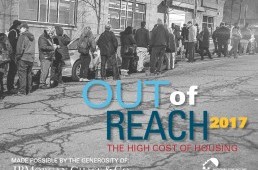
July 14, 2017 | by Michael Wilt
Categories: Affordable Housing, Rental Housing
The National Low Income Housing Coalition recently released its annual "Out of Reach" report, which calculates the hourly wage a household needs to earn to afford a modest market rate apartment. The report calls this figure the Housing Wage.
In Texas, the Housing Wage is $18.38/hour which amounts to $3,186 monthly and $38,234 annually. That is what a household must earn to afford the state's average fair market rent of $956 for a two-bedroom apartment without being cost burdened (spend less than 30% of income on housing costs.)
The good news is that comparatively speaking, housing costs in Texas are lower than the national average rent of $1,103 for a two-bedroom apartment. The bad news is that the average renter in Texas only earns $17.89/hour which means the average rent is out of reach for many households.
We last covered the "Out of Reach" report in a 2015 blog entry. Then, Texas' Housing Wage stood at $16.62/hour and increased to $17.60 in 2016. This is a worrisome trend that reflects escalating housing costs.
In order to afford rising housing costs, Texas families earning less than the Housing Wage often have to work more than 40 hours a week, get other jobs which means less time at home with family, or cut back on other necessities like food, transportation and health care costs.
Here are other key findings from the report:
We encourage you to read the "Out of Reach" report for more information including detailed data on wages and housing costs for every state, metropolitan area and county.
On the House blog posts are meant to provide general information on various housing-related issues, research and programs. We are not liable for any errors or inaccuracies in the information provided by blog sources. Furthermore, this blog is not legal advice and should not be used as a substitute for legal advice from a licensed professional attorney.
I have been trying to find a affordable apartment for over a year. What I’m finding is not only has Dallas County Apartments has increase their rent, but they go by a Three times rule. I’m retired and it has been impossible to rent, it doesn’t even matter if something is on my credit, which apartments by pass that, if you don’t make 3 times the rent there is no conversation, why is that?
Sherri, To answer your question, housing costs are rising along with the hourly wage needed to be able to afford a modest, market-rate apartment. The National Low Income Housing Coalition found that an hourly wage of $18.38 was needed in order to afford a modest, market-rate apartment however the average renter in Texas earns only $17.89 an hour. Minimum wage workers are even further from being able to afford the average rent, needing to work the equivalent of 2 to 2.5 full time jobs in order to afford a one or two bedroom apartment. Housing costs continue to rise, which has led many families to choose between working longer hours or cutting back on necessities like food, transportation and healthcare.
Why is this happening?
TSAHC reviews all blog comments before they are posted to ensure a positive experience for our online community. Off-topic comments; hostile, derogatory or deliberately insulting comments; and comments specifically promoting goods and services will not be posted.
Approved comments will be published in their entirety. Personal information will not be removed unless it pertains to someone other than the person submitting the comment. For more information, please see our Comment Posting Guidelines.
To remove a previously submitted and published comment, please contact Anna Orendain at [email protected].
If you have a question regarding any of TSAHC's programs, please contact us.

Hi Jessie, the Texas Housing Counselor website tool can help you find an affordable apartment in your area (http://texashousingcounselor.org/). A housing counselor can also provide additional resources.